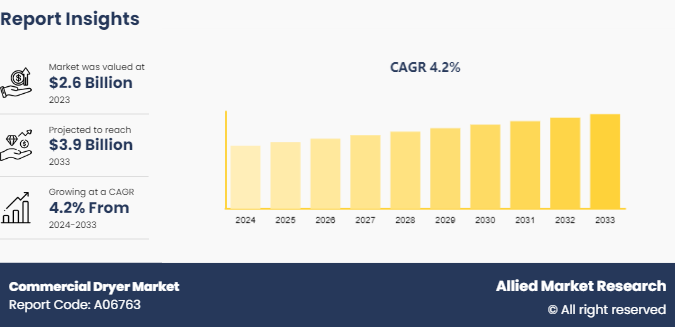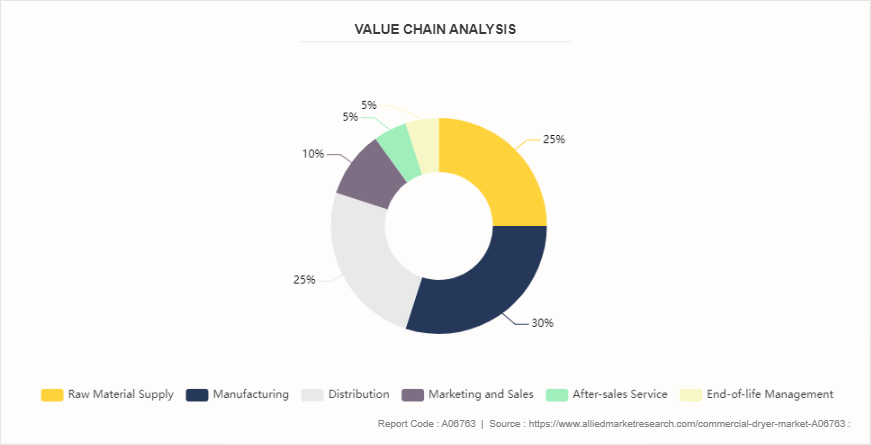Commercial Dryer Market Research, 2033
The global commercial dryer market size was valued at $2.6 billion in 2023 and is projected to reach $3.9 billion by 2033, growing at a CAGR of 4.2% from 2024 to 2033.

Market Definition and Overview
Laundry machines for commercial purposes are designed for large-scale clothing cleaning and drying operations in commercial establishments such as hotels, hospitals, or laundries. It is characterized by large sizes, large weight capacities, and the ability to handle frequent drying cycles. Rapid growth in the hospitality and healthcare industries has led to the emergence of many new hotels and hospitals. This has led to an increase in the purchase of laundry dryers by such establishments. This is attributed to the fact that these establishments house a large number of people, and they need to keep their clothes as well as their bedding and other fabrics clean. The need for quick and efficient cleaning by such establishments propels the need as well as sales for commercial-grade laundry dryers. These dryers are also becoming more popular in areas where there is businesses that offer laundry services and are upgrading their machinery to incorporate new technology.
Key Takeaways
The commercial dryer market study covers 20 countries. The research includes a segment analysis of each country in terms of value ($billion) for the forecast period 2024-2033.
More than 1, 500 product literatures, industry releases, annual reports, and other such documents of major commercial dryer industry participants along with authentic industry journals, trade associations' releases, and government websites have been reviewed for generating high-value industry insights.
The study integrated high-quality data, professional opinions and analysis, and critical independent perspectives. The research approach is intended to provide a balanced view of global markets and to assist stakeholders in making educated decisions in order to achieve their most ambitious growth objectives.
???????Key market dynamics
The use of laundry dryers is highly prevalent in most of the western countries and developed countries. People in most developing countries across the world dry their clothes outside their houses, on balconies, verandas, and backyards using natural air and sunlight. However, there is a tremendous rise in pollution in such countries and drying clothes outside harms clothes by discoloration as well as adhesion of dirt, dust, and particulate matter. There is also the threat of small animals and birds soiling these clothes and sometimes leading to rips and tears in their clothes. Hence, to overcome these problems, many consumers are transitioning over to laundry dryers from traditional air drying. Consumers are becoming aware of various advantages associated with laundry dryers, which is leading to a greater adoption of such types of dryers.
There has been an increase in the number of users on various social media sites such as Instagram, Facebook, and Twitter and other informative and browsing websites with a rise in internet penetration. There is a large section of society that is availing use of internet and multimedia facilities across the globe. Taking this into consideration, most key players in the laundry dryers market strategize promoting their products and services on these digital and multimedia platforms. Social media marketing is one of the major strategies adopted by various companies and industries to impart awareness about their product offerings among target customers on social media channels. The use of televisions and infomercials to spread awareness about laundry dryers and their advantages is also a major marketing tactic used by stakeholders which is expected to proepl commercial dryer market growth in the upcoming years.
Many home appliances in the modern world are useful but are made in a standardized format. Modern consumers are looking for products that are new and can provide additional value and quality and have something new that can make work easier. Many engaged stakeholders are deploying new and innovative ideas to stand apart from the competition. The conversion of regular appliances to smart appliances is one of the biggest innovations undertaken in laundry dryers. Users of dryers can use mobile applications to set time and load for drying clothes and can create different profiles for different types of drying cycles. They also get notifications on their phones regarding the completion of drying or other important notifications. These innovations in laundry dryers are leading to an increase in the number of purchases of laundry dryers across the world.
Value Chain Analysis
The value chain of the commercial dryer market includes various stakeholders’ raw material suppliers, manufacturers, distributors, and end users. Each of these players adds a specific value at their point of operation, which, in turn, contributes to the competitive value of the product.
Raw Material Supply
The raw materials used in manufacturing commercial dryers include metals (steel, aluminum) , plastic components, electronic parts, and insulation materials. The supply chain starts with the procurement of these raw materials, which must meet specific quality standards to ensure durability and performance.
Manufacturing
This stage involves the actual production of commercial dryers, which includes cutting, welding, assembling, and testing. The process is highly automated, utilizing advanced machinery and robotics to ensure precision and consistency.
Distribution
Once manufactured, commercial dryers are distributed to retailers, wholesalers, and directly to end-users. This involves logistics planning, warehousing, and transportation.
Marketing and Sales
Marketing and sales efforts are crucial for promoting commercial dryers to potential customers, including laundromats, hotels, and industrial facilities. This includes digital marketing, trade shows, and direct sales teams.
After-sales Service
After-sales services include installation, maintenance, repairs, and customer support. This step ensures customer satisfaction and long-term product performance.
End-of-life Management
This final stage involves the disposal or recycling of commercial dryers after their useful life. It focuses on environmentally responsible practices.

Market Segmentation
The commercial dryer market has been segmented based on product type, fuel type, application, and region. Based on product type, the commercial dryer market is bifurcated into tumble dryers, condenser dryers, heat pump dryers, and vented dryers. Based on fuel type, the market is segmented into electric dryers and gas dryers. Based on application, the market is divided into hospitality, healthcare, laundromats, educational institutions, commercial laundry services, and others. Region-wise, the market is divided into North America, Europe, Asia-Pacific, Latin America, Middle East and Africa.
Regional Market Outlook
Europe held the major commercial dryer market share of the market in 2023. European market still dominates in the fashion industry, with the majority of the top commercial dryer companies headquartered in UK, Italy, France, and Switzerland. For Europe, the rise in the tourism industry has had a positive impact on tourist shopping, resulting in the growth in commercial dryer market demand in the country. ???????
Industry Trends
Increasing demand for energy-efficient dryers to reduce operational costs and environmental impact. For instances, Electrolux introduced the Line 5000 series, which uses 60% less energy compared to traditional models. They employ heat pump technology to maximize energy efficiency, reducing utility bills and carbon footprints for commercial users.
Adoption of IoT-enabled dryers for better control, monitoring, and efficiency. For instance, Whirlpool Corporation launched smart commercial dryers with connectivity features that allow remote monitoring and control via smartphone apps. These dryers notify users of maintenance needs and operational status, improving overall efficiency and reducing downtime.
Incorporation of advanced technologies such as steam and sensor drying. For instance, Alliance Laundry Systems developed dryers equipped with OPTidry Over-dry Prevention Technology, which uses sensors to detect moisture levels and terminate drying at the optimal time. This reduces energy use and fabric wear, extending the life of linens and garments.
Growing need for customizable and flexible dryer solutions to meet specific industry requirements. For instance, Girbau offers customizable drying programs in their ED series dryers, allowing businesses to tailor drying cycles to specific fabric types and moisture levels. This flexibility caters to diverse industry needs, from healthcare to hospitality.
Competitive Landscape
The major players operating in the commercial dryer market include AB Electrolux, General Electric, Aqualogic, Alliance Laundry Systems, Stefab, IFB Industries, Dexter Apache Holdings, LG Electronics, American Dryer, and Continental Girbau.
Recent Key Strategies and Developments
In July 2024, LG Electronics recently acquired an 80 percent stake in Athom, an industry-leading smart home platform company based in Enschede, Netherlands.
In December 2023, Electrolux Professional Group to acquire Tosei Corporation, a leading Japanese manufacturer of professional laundry equipment and vacuum packing machines
In January 2021, LG Acquires Controlling Stake in TV Data and Measurement Firm Alphonso.
Key Sources Referred
American Society of Heating, Refrigerating and Air-Conditioning Engineers (ASHRAE)
American National Standards Institute (ANSI)
Association of Home Appliance Manufacturers (AHAM)
International Electrotechnical Commission (IEC)
International Organization for Standardization (ISO)
European Committee for Standardization (CEN)
Underwriters Laboratories (UL)
National Fire Protection Association (NFPA)
Appliance Standards Awareness Project (ASAP)
Environmental Protection Agency (EPA)
Department of Energy (DOE)
European Commission (EC)
Consumer Product Safety Commission (CPSC)
British Standards Institution (BSI)
Australian Competition and Consumer Commission (ACCC)
Key Benefits For Stakeholders
- This report provides a quantitative analysis of the market segments, current trends, estimations, and dynamics of the commercial dryer market analysis from 2024 to 2033 to identify the prevailing commercial dryer market opportunities.
- The market research is offered along with information related to key drivers, restraints, and opportunities.
- Porter's five forces analysis highlights the potency of buyers and suppliers to enable stakeholders make profit-oriented business decisions and strengthen their supplier-buyer network.
- In-depth analysis of the commercial dryer market segmentation assists to determine the prevailing market opportunities.
- Major countries in each region are mapped according to their revenue contribution to the global market.
- Market player positioning facilitates benchmarking and provides a clear understanding of the present position of the market players.
- The report includes the analysis of the regional as well as global commercial dryer market trends, key players, market segments, application areas, and market growth strategies.
Commercial Dryer Market Report Highlights
| Aspects | Details |
| Market Size By 2033 | USD 3.9 Billion |
| Growth Rate | CAGR of 4.2% |
| Forecast period | 2024 - 2033 |
| Report Pages | 270 |
| By Product Type |
|
| By Fuel Type |
|
| By Application |
|
| By Region |
|
| Key Market Players | IFB Industries, LG Electronics, Aqualogic, Dexter Apache Holdings, AB Electrolux, Alliance Laundry Systems, American Dryer, Continental Girbau, Stefab, General Electric |
The global commercial dryer market was valued at $2.6 billion in 2023, and is projected to reach $3.9 billion by 2033, growing at a CAGR of 4.2% from 2024 to 2033.
The commercial dryer market has been segmented based on product type, fuel type, application, and region. Based on product type, the commercial dryer market is bifurcated into tumble dryers, condenser dryers, heat pump dryers, and vented dryers. Based on fuel type, the market is segmented into electric dryers and gas dryers. Based on application, the market is divided into hospitality, healthcare, laundromats, educational institutions, commercial laundry services, and others. Region wise, the ma
Europe is the largest regional market for commercial dryer
The major players operating in the commercial dryer market include AB Electrolux, General Electric, Aqualogic,Alliance Laundry Systems, Stefab, IFB Industries,Dexter Apache Holdings, LG Electronics, American Dryer, and Continental Girbau.
The global commercial dryer market report is available on request on the website of Allied Market Research.
Loading Table Of Content...



